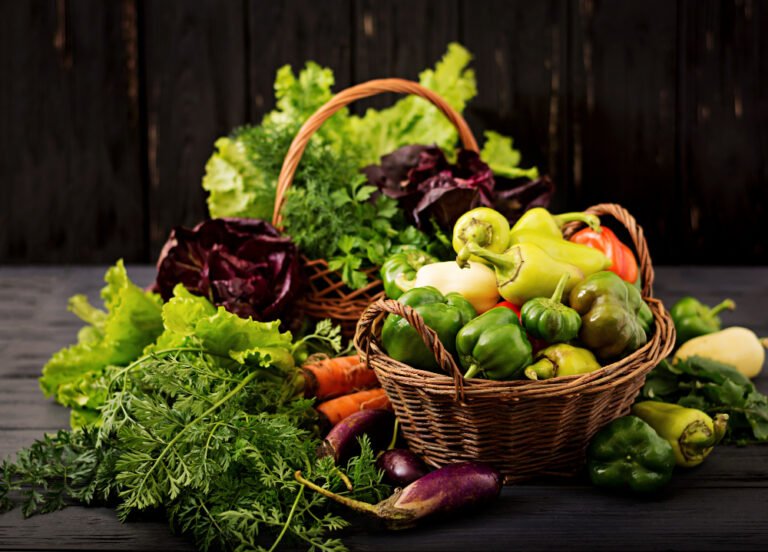Defence Gardens | Online Nursery Lahore

What is Organic Gardening? / Introduction:
Organic gardening is a way of growing plants that does not use synthetic fertilizers, pesticides, or genetically modified organisms (GMOs). Instead, it uses natural techniques to maintain soil fertility and control pests and diseases, such as composting, crop rotation, and companion planting.
Benefits of Growing Organic Vegetables:
Growing organic vegetables has a number of advantages. They are better for you and the environment because they have fewer harmful chemicals and encourage biodiversity. Growing your own food also allows you to save money and improve your self-sufficiency.
Preparing Your Backyard for Organic Vegetable Gardening
A) Preparing Soil:
Soil preparation is vital to successful organic vegetable gardening. You must ensure that your soil is healthy, fertile, and well-drained. Here are some procedures to follow:
1. Determine the pH and nutrient content of your soil.
2. Improve soil structure and fertility by adding organic matter, such as compost or aged manure.
3. Use natural mulch, such as straw or leaves, to keep moisture in and weeds out.
B) Choosing Suitable Vegetables:
The best vegetables to grow in your backyard are determined by your local climate, soil, and personal preferences. Here are some pointers:
1. Select vegetables that are appropriate for your climate and soil conditions.
2. Begin with simple vegetables like tomatoes, peppers, lettuce, and herbs.
3. Consider companion planting to help your vegetables grow and taste better.
Plantation & Maintenance:
A) Plantation:
There are a few things to consider when planting your organic vegetable garden:
1. Plant at the appropriate time, depending on the vegetable and your location.
2. Properly space your plants to avoid overcrowding and promote air circulation.
3. Consider using raised beds or containers to improve soil drainage and weed and pest control.
B) Watering:
It is important to water your organic vegetable garden to ensure that your plants grow healthy and strong. Here are some pointers:
1. Water your plants infrequently and deeply rather than frequently and shallowly.
2. Water in the morning or evening, when temperatures are cooler and evaporation is lower.
3. Conserve water by using a drip irrigation system or a soaker hose.
C) Fertilizing:
Fertilizing your organic vegetable garden is essential for guaranteeing that your plants receive the nutrients they require to grow and produce a bountiful harvest. Here are some pointers:
1. Make use of natural fertilizer application like compost, aged manure, or worm castings.
2. Apply fertilizers in accordance with your plants’ needs and the manufacturer’s recommendations.
3. During the growing season, use foliar feeding or side dressing to provide additional nutrients to your plants.
D) Pest Control:
Controlling pests and diseases in your organic vegetable garden is critical for preventing plant damage and lowering the risk of crop failure. Here are some pointers:
1. Use companion planting to attract beneficial insects while repulsive pests.
2. Use physical barriers to keep pests out of your plants, such as row covers or netting.
3. As a last resort, use natural pesticides such as neem oil or insecticidal soap.
Harvesting Your Organic Vegetables:
When to Harvest?
It is critical to know when to harvest organic vegetables to ensure that they are at their peak flavour and nutritional value. Here are some pointers:
1. Harvest vegetables when they are fully mature but not overripe.
2. Verify the recommended harvesting time for each vegetable, as it may differ.
3. Harvest the plants in the morning, when they are cool and hydrated.
Tips for Harvesting:
Harvesting organic vegetables requires some caution in order to avoid harming the plants or the produce. Here are some pointers:
1. Cut the vegetables with sharp and clean tools such as scissors or pruning shears.
2. Gently handle the produce to avoid bruising or crushing.
3. Store the vegetables properly, according to their specific needs, to keep them fresh and flavorful.
Therefore, Growing organic vegetables in your own backyard is a fulfilling and rewarding experience. By following these guidelines, you can grow a thriving garden that will provide you with fresh and nutritious produce all year. Remember to start small, learn from your mistakes, and have fun along the way!
